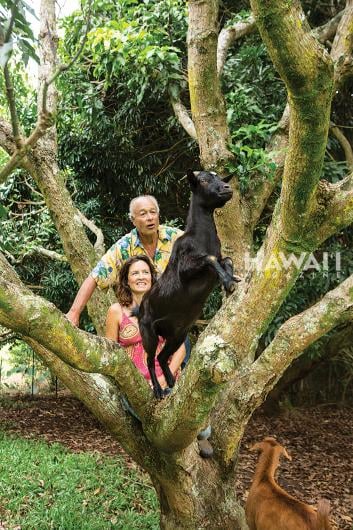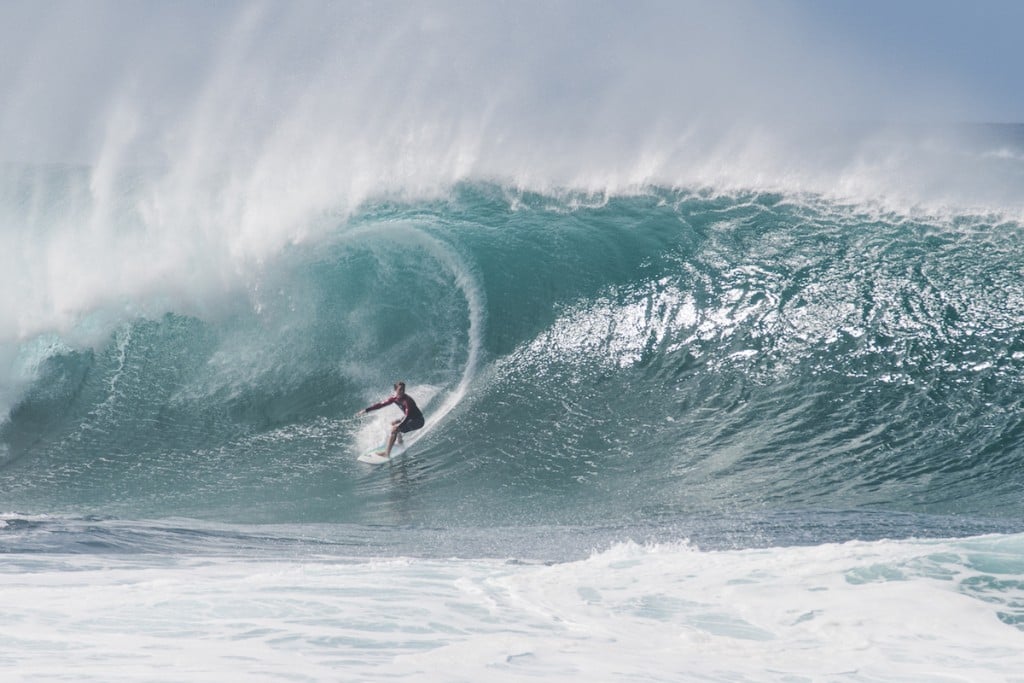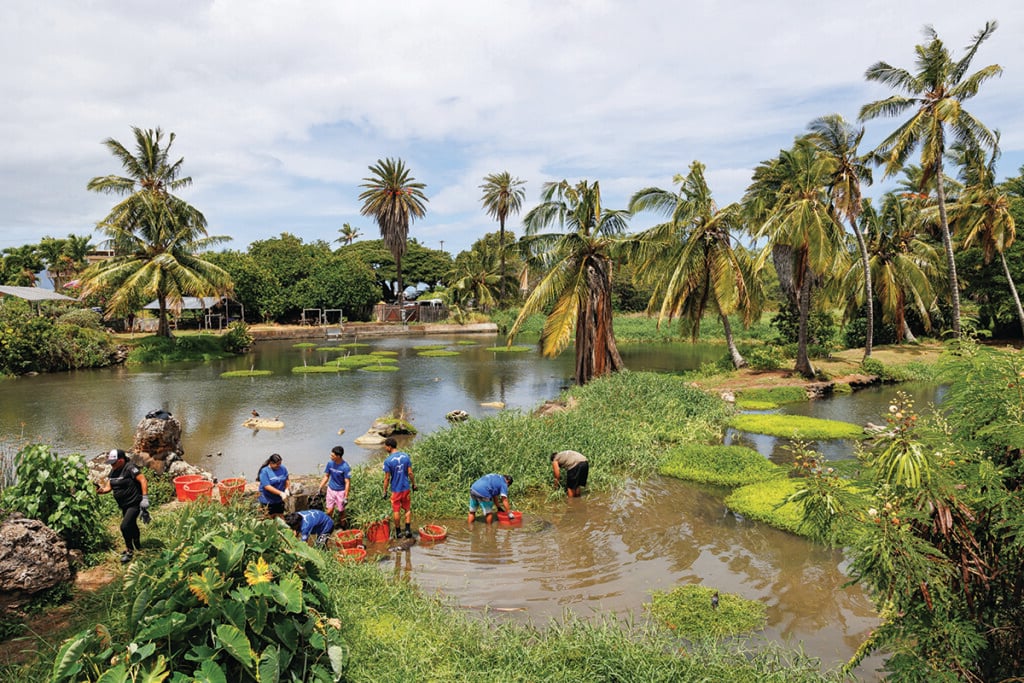Greener Pastures: A Visit to Maui’s Leilani Farm Sanctuary

First off, apologies from this longtime city dweller to anyone raised or currently living on a farm with livestock. Up until now, I’d never held a fuzzy, month-old baby goat as he eagerly slurped milk from a baby bottle. Up until this afternoon, I’d never cuddled a chicken named Akachan (“baby” in Japanese) as she sat in my arms, allowing me to stroke her soft feathers.
Perhaps that’s why I immediately think it’s pretty cool that Laurelee Blanchard gets to do both of these tasks every day, enjoying every minute of it. Or maybe it’s because Blanchard is the founder and owner of Leilani Farm Sanctuary, eight acres of verdant farmland tucked into the quiet Upcountry Maui community of Haiku set aside to provide a nurturing environment for more than 200 animals of more than a dozen species, many of whom were abused, abandoned or orphaned.

The sanctuary is open to animal lovers of all ages to hang out and, for those feeling especially benevolent, welcomes volunteer caretakers.
“I feel lucky to be doing this,” says Blanchard, as I place baby goat Alex in her arms. “I love every aspect of the farm.”
The sanctuary is also home to Blanchard and her partner, Barry Sultanoff, who, with the aid of a cadre of dedicated volunteers, help maintain the bucolic refuge for animals. Before Leilani Sanctuary, Blanchard was a senior vice president of a national commercial real estate firm, where fast-paced, demanding workdays were pretty much de rigueur. On regular walks through a park in her Laguna Beach, Calif., neighborhood after work to unwind, she would often encounter homeless, sometimes abandoned, cats.

On one of these walks she took a cat home. On another day, she scooped up one more, then on still another day, two more. She became involved with Orange County People for Animals, a local animal-rights organization. Soon enough, she wanted to make animal rescue her fulltime mission. But not in California.
In 1999, Blanchard quit her real estate job, used her savings to purchase the farmhouse and Haiku acreage Leilani Sanctuary now occupies and moved herself and her then 11-strong clowder of rescued cats to Maui seeking a fresh start and new mission for her life. Fifteen years later, Leilani Farm Sanctuary is home to a growing congress of rescued chickens, roosters, geese, ducks, rabbits, goats, donkeys, pigs, cows, tortoises and, yes, kitties. The sanctuary—named after its first resident, a donkey named Leilani—is also Blanchard’s primary means of educating and raising awareness of animal rights.
On the breezy Tuesday afternoon I visit, Blanchard, Sultanoff and I stroll the sanctuary pastures with Alex the baby goat trailing behind while simultaneously trying to nibble grass. There’s plenty of grass to chew, trees to climb and pasture to roam for every animal, including lots of friends from other species, should they wish to socialize. Every species also has its own enclosure or mini-barn, much of it constructed with donations to the nonprofit sanctuary.
Many of the animals at Leilani Sanctuary arrive as babies and spend their entire lives on its acreage. Blanchard can recall every animal’s adoption story, and each is given a name—often belonging to someone the couple knows. As we stop at the enclosure belonging to Berney the boar, Sultanoff explains with a laugh that not all of the animals’ human namesakes fully appreciate the friendly name game.
Blanchard tells me she loves every animal in the sanctuary, but there’s a special place in her heart for Berney (named after a good friend of the couple). One day, she noticed the piglet outside the fenced enclosure of another sanctuary pig named Kea. The piglet would return each day to the same spot to be near Kea. Soon enough, Blanchard brought Berney into the fold. The sight of Blanchard planting an affectionate peck on Berney is not uncommon.
“Sometimes she’ll come in the house and I’ll say, ‘Laurelee, you’ve got a lil’ something on your face,’” says Sultanoff, pointing to his cheek.
The couple works hard to make sure their animals eat fresh, healthy food. Alongside their yellow farmhouse is a vibrant garden chock-full of lettuce, eggplants, Hawaiian chili peppers and other veggies. The leafy greens are for the rabbits. The eggplants go to the pigs. The peppers? That’s for the farmhouse’s humans.
“We both like spicy cooking,” says Sultanoff, adding that he and Blanchard are vegans.
A local organic grocery and feed store regularly donates produce and feed for the sanctuary’s animals. Maui resident and visitor volunteers help with much of the rest of the farm work. A group of visiting volunteers had recently helped Blanchard and Sultanoff weed the garden and dig a pig bath prior to my visit.

Living and working on a farm, there is always plenty to do, so Blanchard and Sultanoff greatly appreciate the help of visitors of all ages, whether they can stay for an hour or an entire day. Folks who just wish to tour the sanctuary and visit the animals are welcome, by reservation.
“We have a lot of repeat visitors who volunteer. They remember the animals and their names,” says Blanchard with a look of pride. The experience offers visitors and volunteers a prosperous example of humane living. “We want them to regard [the animals] as more than meat.”
Approachable sanctuary animals such as Berney, Veronica the orphaned axis deer and Obi the blind rooster, who was rescued from a life of cockfighting, show that not all game and sport animals are dangerous, troublesome or useless. While on the farm, I was never preached to, but I did leave with a better understanding of Blanchard’s dedication to animal advocacy.
And about 10 new furry friends to brag to my city friends about.


